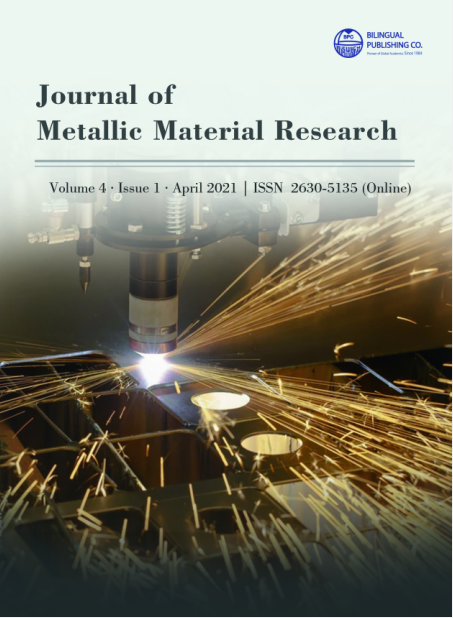-
169
-
151
-
147
-
104
-
71
A Constitutive Modeling and Experimental Effect of Shock Wave on the Microstructural Sub-strengthening of Granular Copper
DOI:
https://doi.org/10.30564/jmmr.v4i1.3631Abstract
Micro-sized copper powder (99.95%; O≤0.3) has been shock-processed with explosives of high detonation velocities of the order of 7.5km/s to observe the structural and microstructural sub-strengthening. Axisymmetric shock-consolidation technique has been used to obtain conglomerates of granular Cu. The technique involves the cylindrical compaction system wherein the explosive-charge is in direct proximity with the powder whereas the other uses indirect shock pressure with die-plunger geometry. Numeric simulations have been performed on with Eulerian code dynamics. The simulated results show a good agreement with the experimental observation of detonation parameters like detonation velocity, pressure, particle velocity and shock pressure in the reactive media. A pin contactor method has been utilized to calculate the detonation pressure experimentally. Wide angled x-ray diffraction studies reveal that the crystalline structure (FCC) of the shocked specimen matches with the un-shocked specimen. Field emissive scanning electron microscopic examination of the compacted specimens show a good sub-structural strengthening and complement the theoretical considerations. Laser diffraction based particle size analyzer also points towards the reduced particle size of the shock-processed specimen under high detonation velocities. Micro-hardness tests conducted under variable loads of 0.1kg, 0.05kg and 0.025kg force with diamond indenter optical micrographs indicate a high order of micro-hardness of the order of 159Hv. Nitrogen pycnometry used for the density measurement of the compacts shows that a compacted density of the order of 99.3% theoretical mean density has been achieved.
Keywords:
Shock waves; Wide angle x-ray diffraction; Microstructure; FE-SEM; Laser diffraction; MicrohardnessReferences
[1] P.K. Samal, J.W. Newkirk, ASM handbook, Powder metallurgy, 7 (2015).
[2] J.R. Davis, Copper and copper alloys, ASM International (2001).
[3] E. Klar, D. F. Berry, Copper powder metallurgy products, ASM handbook, 2 (1990).
[4] S. Wahyudi, S. Seopryianto, M.Z. Mubarok, Sutarno, IOP Conf. Ser, Mater. Sci. Eng. 395 (2018) 012014.
[5] P.J. James, Fundamental aspects of the consolidation of powders, Powder Met. Int. 4 (1972) 82.
[6] L. Avramovic , V. M. Maksimovic, Z Bascarevic, N. Ignjatovic, M. Bugarin, R.Markovic , N.D. Nikolic , Influence of the shape of copper powder particles on the crystal structure and some decisive characteristics of the metal powders, Metals, 9 (2019) 56.
[7] A.D. Sharma, A.K. Sharma, N. Thakur, Study on the crystal structure and microstructure evolution of shock-processed Titanium powder, J. Met. Mater. Res. 2 (2019) 26-31.
[8] A.D. Sharma, A.K. Sharma, N. Thakur, Effect of explosive contact and non-contact shock processing on structure, microstructure and mechanical characteristics of aluminium, Appl. Phys. A 111 (2013) 783-789.
[9] A.D. Sharma, A.K. Sharma, N. Thakur, Crystallographic, microstructural and mechanical characterization of dynamically processed EP741NP superalloy, Metall. Mater. Trans. B 47 (2016) 2479-2486.
[10] M.A. Meyers, D. J. Benson, E.A. Olevsky, Shock consolidation: microstructurally-based analysis and computational modeling, Acta. Mater. 28 (1999) 2089-2108.
[11] C.T. Wei, E. Vitali, F. Jiang, S.E. Du, D.J. Benson, K.S. Vecchio, N.N. Thadhani. M.A. Meyers, Quasi-static and dynamic response of explosively consolidated metal–aluminum powder mixtures, Acta. Mater. 60 (2012) 1418-1432.
[12] A.D. Sharma, A.K. Sharma, N. Thakur, Study on the crystal structure and microstructure evolution of shock-processed Titanium powder, J. Met. Mater. Res. 2 (2019) 26-31.
[13] A.D. Sharma, A.K. Sharma, N. Thakur, Crystallographic and morphological characteristics of explosively compacted copper under various detonation velocities, Phil. Mag. 92 (2012) 2108-2116.
[14] M.A. Meyers, Dynamic behavior of materials, Wiley, 1994.
[15] M.A. Meyers, D.J. Benson, E. A. Olevsky, Shock consolidation: Microstructurally-based analysis and computational modeling, Acta. Mater. 47 (1999) 2089-2108.
[16] A.D. Sharma, A.K. Sharma, N. Thakur, Effect of explosive contact and non-contact shock processing on structure, microstructure and mechanical characteristics of aluminium, Appl. Phys. A 111 (2013) 783-789.
[17] D.G. Morris, Microstructure changes taking place during dynamic compaction of aluminium powders, J. Mater. Sci. 21 (1986) 1111-1117.
[18] A.D. Sharma, A.K. Sharma, N. Thakur, Crystallographic, microstructural and mechanical characterization of dynamically processed EP741NP superalloy, Metall. Mater. Trans. B 47 (2016) 2479-2486.




 A. D. Sharma
A. D. Sharma






